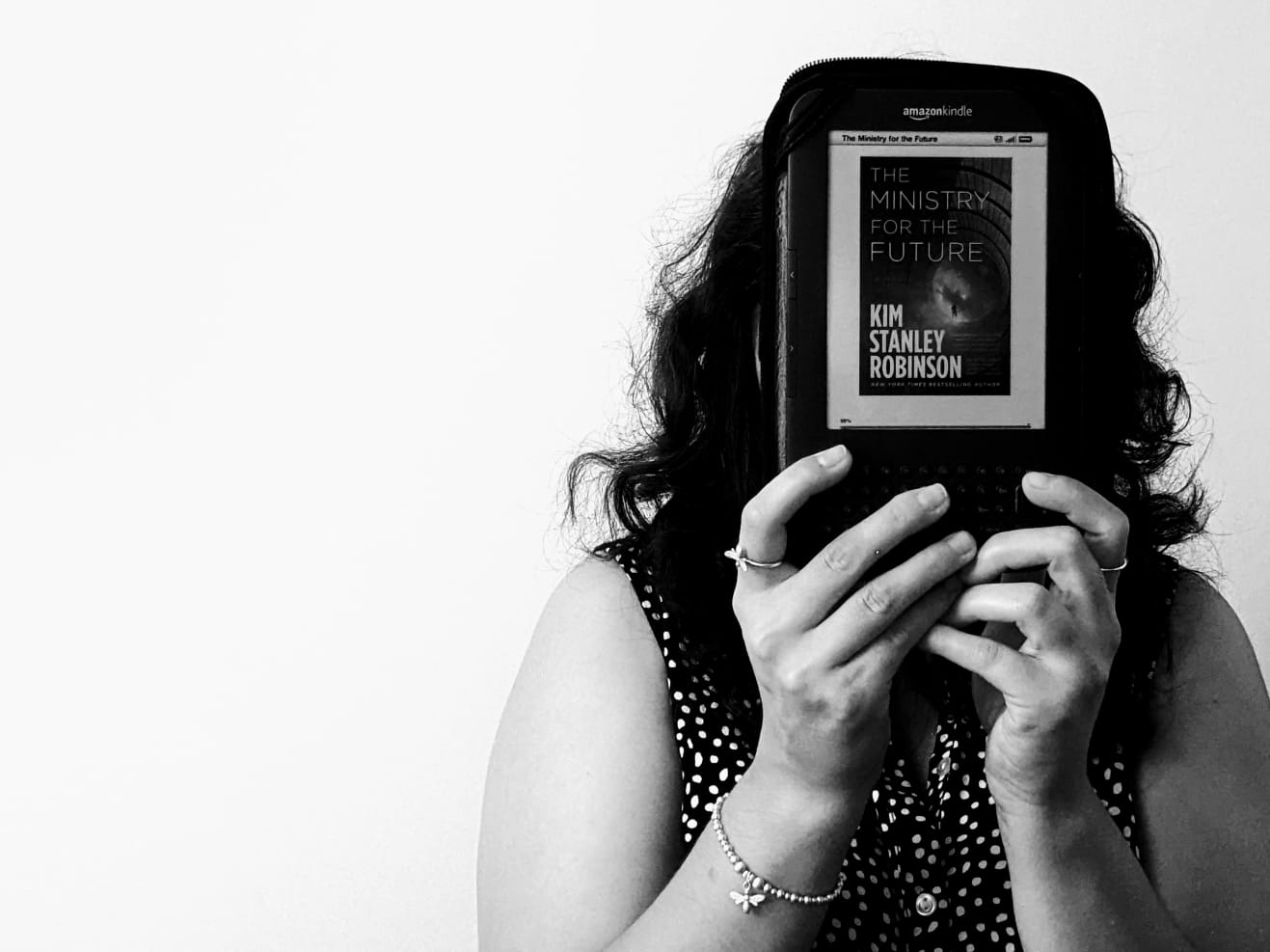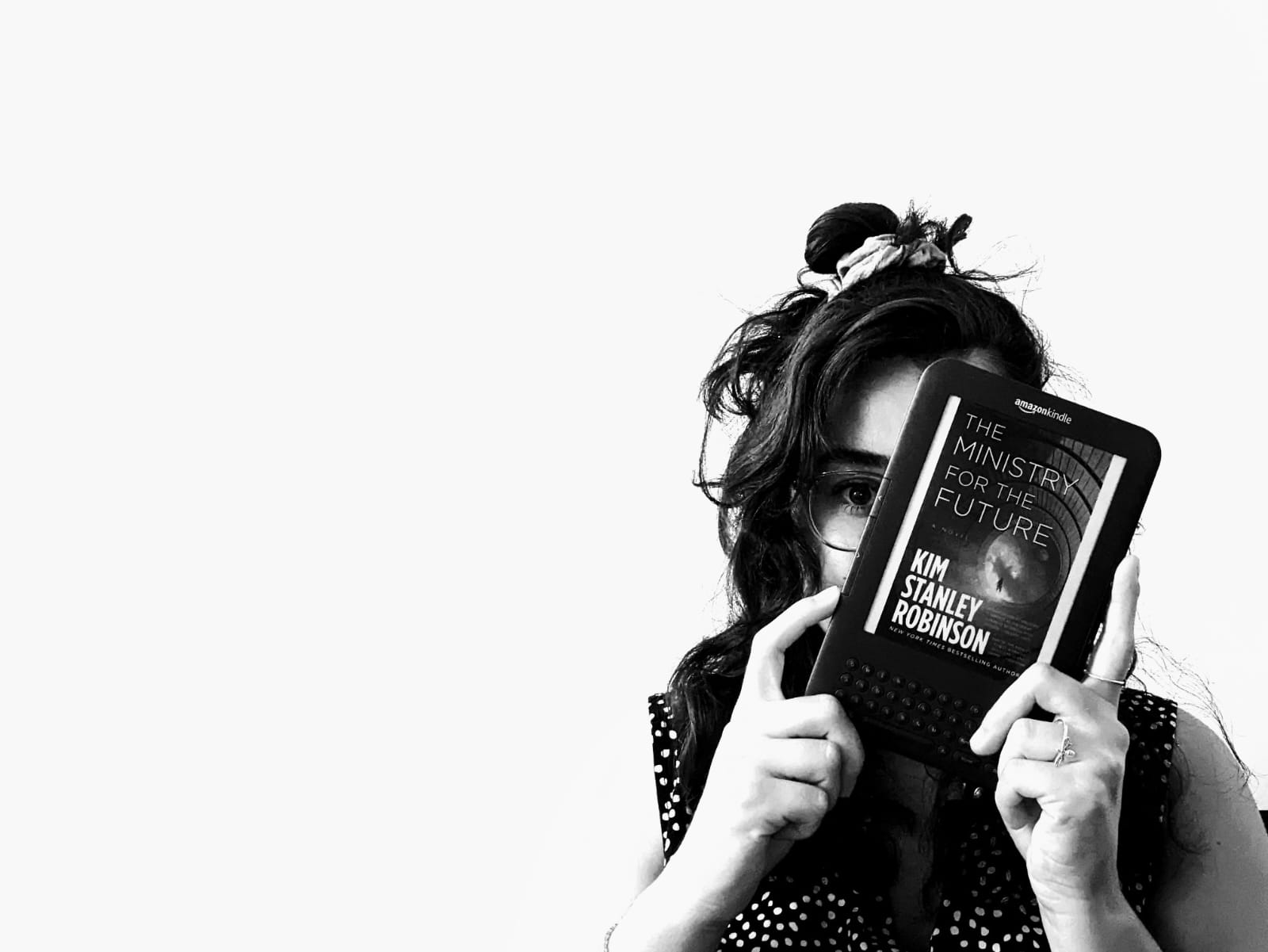The Ministry for the Future
by Kim Stanley Robinson
The most striking aspect of Ministry for the Future will always be the beginning chapter. This is what got me to read the book, and remains the part that has stayed with me for weeks after. Seeing images of England now with acres of parched, dead grass where once supple green lawns reigned supreme after the heat waves of this summer, anticipating the excess deaths that this brutal heat has brought, feeling for myself how the insufficient infrastructure here, combined with the heat, made myself less productive and prone to heat stroke as an otherwise healthy 20-something, makes the imagery of that first chapter—where a deadly heat wave hits India—resonate even more strongly. You can read that first chapter here.
Ministry has been lauded by many, with the author, Kim Stanley Robinson, one of the most prolific #clifi authors out there, boasting a bibliography that holds a true range of science-fiction, some titles more hard science-fiction than others. It’s been included on former President Barack Obama and Bill Gates’ reading list, has been nominated for various prizes, and reviewed by numerous publishers and journals. The concepts that Robinson writes about, including carbon quantitative easing (itself based upon Global Carbon Reward), has brought climate crisis policies to mainstream readers who perhaps otherwise wouldn’t have learned about them.
The novel switches between different perspectives, with two main characters—Mary Murphy, in charge of the Ministry in question, an organisation set up under the Paris Agreement to solve the climate crisis, and Frank May, introduced in the first chapter. Murphy’s character is based upon diplomats Mary Robinson, Christiana Figueres, and Laurence Tubiana; which was unbeknownst to me until I wrote this post. It was only after reading this novel that I started listening to Outrage and Optimism, but (if I may) Murphy’s character did immediately spring to mind after a few podcast episodes of listening to Figueres. The novel also switches between different formats—vignettes from characters throughout the world, sometimes in the form of a first-hand account, sometimes a poem, sometimes a technical explanation from the point of view of a photon.

At times, this works extremely well—you are immersed in the perspective of someone actually living through the climate crisis, someone in a part of a world you might never have thought about. As you are forced to empathise with them, it turns the climate crisis from some mysterious force dominating the headlines that you can be apathetic about (after all, you’ve not had to ration food, or died from heatstroke, or had your livelihood destroyed by it), to something that you feel more connected to. Not in the least because the Earth itself, or even nature, is sometimes this other character. Robinson's appearance on (Outrage and Optimism makes it clear that you're not just going on a romantic journey with two characters in Ministry; the earth through which these character relate to each other with becomes a third character, sometimes treated lovingly, other times, not so much. Other times, the vignettes, though creative, miss the mark: the perspective isn’t made clear enough, and the change in tonality too abrupt. Additionally, if you are already steeped in knowledge about the climate crisis, you might find yourself skimming some of the explanatory technical aspects; though if you are a newcomer to the science and policy aspects of climate crisis you will find them well-explained without being ‘dumbed down.’ It is also, through and through, a hard science-fiction novel. Whilst able to capture climactic thrills in a way that had you turning the page, there are often jarring phrases that interrupt the pacing in order to point out facts that are unnecessary to the story (e.g. see the first chapter—“And then the sun cracked the eastern horizon. It blazed like an atomic bomb, which of course it was. The field and buildings underneath that brilliant chip of light went dark…” An otherwise lyrical, well put together paragraph is jarringly interrupted to journalistically remind you that the sun is a nuclear-fusing star, the perennial science-fiction writer’s insufferable “Did you know—“ or “Actually—“ put into prose).
Where Ministry can let us down is in the solutions that it proffers to its characters for the climate crisis. I felt more connected to the crisis after empathising with the characters going through this Holocene extinction with us, but bereft whenever I examined or thought about the ways in which the characters attempt to solve said climate crisis. The black-book, back-room nature the Ministry develops seems to have been one of the most effective elements of the overall strategy developed by the characters to fight against climate crisis—yet it is difficult to imagine that this could be pulled off in real life. The actions taken by India immediately after the first chapter, though well explored in the novel in terms of the effect it had on climate change policies and character development, I’m not sure would realistically work—likewise for the geoengineering project taken in Antarctica. Carbon quantitative easing, as described in the novel, would likely be even more of a battle to be recognised or adopted in a manner that actually works in this reality—as we already witness carbon taxes being dodged by corporations and countries today. Robinson has even since come out to suggest that he regrets introducing the cryptocurrency used in the book (this, by the way, has been introduced in some endangered biomes, to heavy criticism from researchers and scientists).

There is much focus in Ministry on the affects of climate crisis in economies and countries closer to the equator, and often Ministry gets referenced when disasters such as the worsening Australian and Western US fires occur. However, studies have shown that it is not just the Global South that will be implicated with the climate crisis—there is realistically just as much danger (even just purely economically) for the Global North. Just this summer, we have witnessed heatwaves across Europe that have fostered conditions for drought and wildfire just as dire for the economies involved, and as we all know: this will be the coldest summer you have lived through. These problems are not going away, nor will they remain geographically isolated to a country remote to yours.
it looked like the great heat wave would be like mass shootings in the United States— mourned by all, deplored by all, and then immediately forgotten or superseded by the next one, until they came in a daily drumbeat and became the new normal.
--Kim Stanley Robinson, The Ministry for the Future

Hope can absolutely be gained from Ministry, the above criticism notwithstanding. The optimism infused without is infectious, and you leave the book feeling like, with enough starting momentum, this could be our future, too. The main characters’ resilience and the way they learn to adapt to the crisis at hand, the way they narrow down on doing what they can, when they can and not getting bogged down by the enormity of the crisis, is inspiring and a model for the attitudes we too, should adopt. But they are not infallible; they have crisis of confidence, and that too, provides a pathway for how you can chew through those similar feelings. Every character has their own strengths that they learn to play to for the sake of the crisis, which is another message I feel has import—we cannot all be Greta Thunberg, or Elon Musk, or Christiana Figueres, or, or, or. We can, and must, do what is within our own personal remit and our passions, for it is only when we all come together that change can be effected for the long-term, and we cannot ask each other to change who we are or what we are passionate about.
We are all living in a science-fiction novel that we are co-authoring together.
—a paraphrasing from Outrage and Optimism's episode with Robinson. So--what kind of character will you be? How will you be contributing?
I will certainly be reading other climate fiction novels by Kim Stanley Robinson, and will keep advocating for versions of the solutions that Ministry sets out. In so many ways, Ministry is a present I wish we lived in--but regardless, I refuse--and encourage you to refuse--that 'fashionable pessimism', as he puts it on Outrage and Optimism; giving in to anxiety or nihilism for the sake of abdicating responsiblity on doing something about the structures that we live in.
Read this and enjoyed it?
- Let me know what you thought and your analysis, and let’s spark a conversation!
- Wonder what some of these concepts, like carbon quantitative easing are, and what issues surround them? Comment and let's chat! I can provide resources and information.


